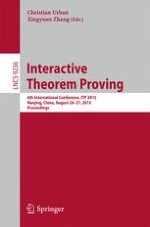2015 | OriginalPaper | Buchkapitel
Improved Tool Support for Machine-Code Decompilation in HOL4
verfasst von : Anthony Fox
Erschienen in: Interactive Theorem Proving
Aktivieren Sie unsere intelligente Suche, um passende Fachinhalte oder Patente zu finden.
Wählen Sie Textabschnitte aus um mit Künstlicher Intelligenz passenden Patente zu finden. powered by
Markieren Sie Textabschnitte, um KI-gestützt weitere passende Inhalte zu finden. powered by
